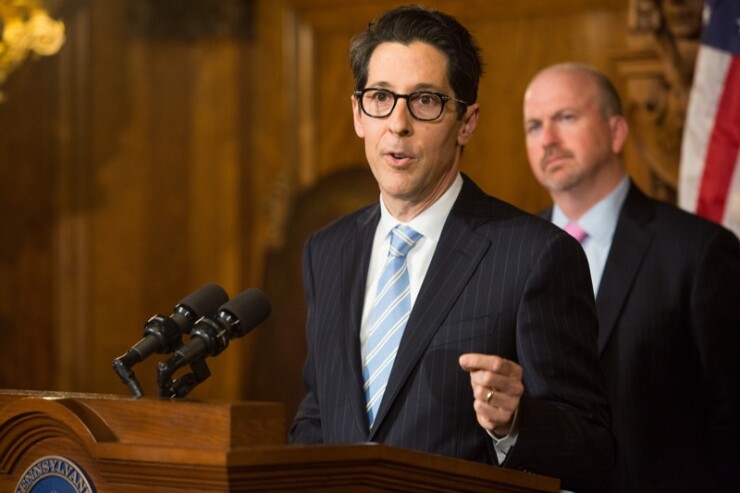Pennsylvania Treasurer Joe Torsella authorized a short-term, two-week $750 million line of credit to the commonwealth, which is six weeks into fiscal 2018 without a spending plan for its $32 billion budget.
Without this transfer from the Treasury's short-term investment pool, Pennsylvania's general fund would fall into negative territory on Aug. 14, Torsella said late Thursday.

Torsella called on Gov. Tom Wolf and lawmakers to pass a "responsible" revenue plan and said red flags surround the unprecedented lending.
“This is deeply troubling," he said.
Wolf is a Democrat. Republicans control the legislature.
Without corrective action, said Torsella, he projects that the general fund balance will become negative in early September and will remain so for two-thirds of the fiscal year. Pennsylvania's need for emergency borrowing could reach $3 billion.
“Cash flow borrowing this early and of this magnitude has not happened in the last twenty-five years," Torsella said in a statement late Thursday. "As a state, we once again find ourselves in uncharted waters, not only having to borrow so early in the fiscal year, but doing so with an underlying general fund budget that is not yet balanced."
Pennsylvania, Connecticut and Wisconsin still lack a finalized budget, Gov. Gina Raimondo signed Rhode Island's spending plan Thursday night.
Fitch Ratings continues to anticipate no immediate rating implications for states with unsigned budgets, the rating agency said Tuesday.
Pennsylvania's legislature passed the spending plan in early July and Wolf signed it, despite the lack of a revenue package to fund it. Last week the Senate approved a package that features tax increases and $1.3 billion of new borrowing. Senate leaders say the measure would close a $2.2 billion deficit.
House of Representatives members are studying the plan.
State Auditor General Eugene DePasquale said the state running out of money in the second month of the fiscal year should be a wakeup call to every elected official in Pennsylvania.
"The House must do the responsible thing and come back next week to address this budget situation," DePasquale said in a statement. "And once they are back, the House and Senate leadership and the governor should immediately lock themselves in a room and work until they figure out a way to provide Pennsylvanians with a balanced budget.”
The commonwealth's late and imbalanced budgets over the past decade have drawn the wrath of bond rating agencies.
S&P Global Ratings on July 6 placed its AA-minus GO rating on the commonwealth on credit watch with negative implications. Moody’s Investors Service rates the commonwealth's GOs Aa3. Fitch Ratings on July 26 maintained its AA-minus rating.
Torsella said a credit downgrade to A or less by S&P would drop it to its lowest since 1978 and make the borrowing costs more expensive to taxpayers. Torsella and DePasquale, in a joint letter to legislators last month,warned that another downgrade would ultimately result in a back-door tax increase for Pennsylvanians because of increased borrowing costs,
Without sufficient money in the general fund, he said, the commonwealth would have to cut certain expenses beyond traditional government operations, including, for example, support for Penn State, Pittsburgh, Temple and Lincoln universities, discretionary grants and other deferrable expenses.
“There are limits to what Treasury can prudently do to bolster the general fund,” said Torsella.





